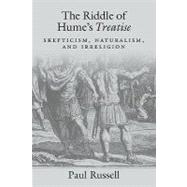The Riddle of Hume's Treatise Skepticism, Naturalism, and Irreligion
, by Russell, Paul- ISBN: 9780199751525 | 0199751528
- Cover: Paperback
- Copyright: 6/15/2010
Although it is widely recognized that David Hume's A Treatise of Human Nature (1739-40) belongs among the greatest works of philosophy, there is little agreement about the correct way to interpret his fundamental intentions. It is an established orthodoxy among almost all commentators that skepticism and naturalism are the two dominant themes in this work. The difficulty has been, however, that Hume's skeptical arguments and commitments appear to undermine and discredit his naturalistic ambition to contribute to "the science of man". This schism appears to leave his entire project broken-backed. The solution to this riddle depends on challenging another, closely related, point of orthodoxy: namely, that before Hume published the Treatise he removed almost all material concerned with problems of religion. Russell argues, contrary to this view, that irreligious aims and objectives are fundamental to the Treatise and account for its underlying unity and coherence. It is Hume's basic anti-Christian aims and objectives that serve to shape and direct both his skeptical and naturalistic commitments. When Hume's arguments are viewed from this perspective we can solve, not only puzzles arising from his discussion of various specific issues, we can also explain the intimate and intricate connections that hold his entire project together. This "irreligious" interpretation provides a comprehensive fresh account of the nature of Hume's fundamental aims and ambitions in the Treatise. It also presents a radically different picture of the way in which HUme's project was rooted in the debates and controversies of his own time, placing the Treatise in an irreligious or anti-Chrisitan philosophical tradition that includes Hobbes, Spinoza and freethinking followers. Considered in these terms, Hume's Treatise constitutes the crowning achievement of the Radical Enlightenment.






